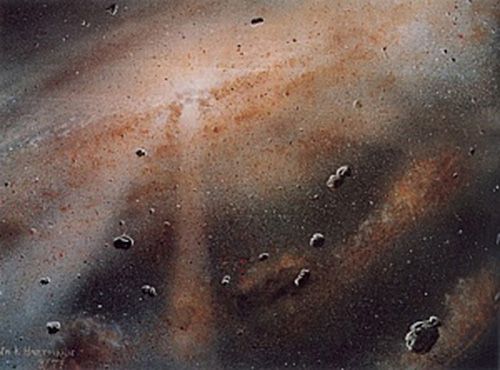Welcome to Learn to Astronomy! In this article, we will delve into the fascinating story of Mars’ birth and unravel the mysteries surrounding its formation. Join us as we explore the cosmic processes that shaped this enigmatic red planet and gain a deeper understanding of our planetary origins. Let’s embark on this celestial journey together!
The Formation of Mars: Unraveling the Mysteries of its Birth in Astronomy
The formation of Mars is a topic that has fascinated astronomers for decades. Scientists have been working tirelessly to unravel the mysteries surrounding the birth of this enigmatic planet.
One key aspect in understanding the formation of Mars is studying the processes that took place in the early solar system. It is believed that Mars formed approximately 4.6 billion years ago, along with other planets, from a swirling disk of gas and dust known as the protoplanetary disk.
During this critical period, known as the planetary accretion phase, small particles of dust and ice began to collide and stick together, forming larger objects called planetesimals. Over time, these planetesimals continued to collide and grow, eventually becoming protoplanets, such as Mars.
One of the prevailing theories regarding the formation of Mars is the process of orbital migration. It suggests that Mars initially formed closer to the Sun but migrated outwards due to interactions with other protoplanets and the leftover gas in the protoplanetary disk. This theory helps explain why Mars ended up at its current location in the solar system.
Another crucial aspect in understanding the formation of Mars is the role of impacts. Throughout its early history, Mars experienced numerous collisions with other protoplanets and smaller bodies. These impact events played a significant role in shaping the planet’s surface and influencing its geological evolution.
In recent years, robotic missions like NASA’s Mars rovers have provided valuable insights into Mars’ geological history. By analyzing the composition of Martian rocks and studying the features on its surface, scientists have been able to refine their understanding of the planet’s formation.
However, despite these advancements, numerous questions and mysteries surrounding the birth of Mars still remain. The exact mechanisms of its formation, the precise timing of key events, and the role of external factors such as the migration of Jupiter and Saturn are still being actively investigated.
In conclusion, the formation of Mars is a complex and captivating topic in astronomy. Through the study of planetary accretion, orbital migration, impacts, and geological evidence from robotic missions, scientists have made significant progress in unraveling the mysteries of its birth. Nonetheless, further research and exploration are needed to fully understand the fascinating story behind the creation of this intriguing planet.
10 Space Photos That Will Give You Nightmares
[arve url=”https://www.youtube.com/embed/pb2MkzCgQ-4″/]
What Scientists Discovered on Mars Shocked the Whole World
[arve url=”https://www.youtube.com/embed/WR4LoZEsjTg”/]
Frequent questions
In conclusion, the formation of Mars, an intriguing and enigmatic planet, is a subject that continues to captivate astronomers and scientists alike. Through the examination of numerous hypotheses and extensive data analysis, researchers have been able to piece together a plausible narrative of how Mars was born. The early stages of its development involved the accretion of dust and gas within the protoplanetary disk, followed by the formation of planetesimals. Eventually, these planetesimals collided and merged, gradually building up the mass of Mars. However, many questions still remain unanswered, as the precise details of Mars’ birth continue to elude us. Further exploration, continued research, and technological advancements will surely bring us closer to unraveling the mysteries surrounding the formation of this fascinating Red Planet.

